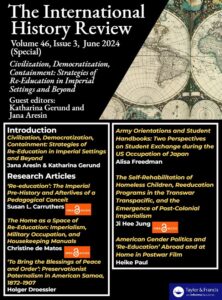Project
This interdisciplinary project (2018-2023) examined US-American reeducation politics in its various aspects in Germany and Japan after World War II in a transnational and comparative perspective. It covered entanglements in the cultural imaginary, the mass media, and civil society at large. The project identified the multidirectional influences, ramifications, and interdependencies between the US and Japan, the US and Germany as well as Japan and Germany which work in each of those domestic as well as foreign settings as part of a foundational discourse of legitimation. For instance, the positive self-representation of the US as a democratic exemplum to Japanese and German audiences points to attempts to mitigate social tensions and conflicts ‘at home’. Individual projects addressed gender regimes (in reeducation and Hollywood films as well as in Japanese women’s magazines), discourses on race (in cultural representations of and by African American soldiers and in Japanese-Okinawan identity constructions), and public opinion (broadcasting and public opinion research in Japan and Germany); instead of looking primarily at national developments, the project covered transnational relations, intra-cultural differences, and subnational formations. The main focus was on the construction of imagined communities as well as the ways in which reeducation efforts unfold in specific contexts characterized by asymmetrical power relations. Ultimately, this project has made significant steps towards establishing “comparative reeducation studies” as an interdisciplinary field of study.
OUT NOW
 Civilization, Democratization, Containment: Strategies of Re-Education in Imperial Settings and Beyond
Civilization, Democratization, Containment: Strategies of Re-Education in Imperial Settings and Beyond
Spec. Issue of The International History Review 46.3 (2024)
Guest ed. by Jana Aresin and Katharina Gerund
with contributions by Susan L. Carruthers, Christine de Matos, Holger Droessler, Alisa Freedman, Ji Hee Jung, and Heike Paul
https://www.tandfonline.com/toc/rinh20/46/3

